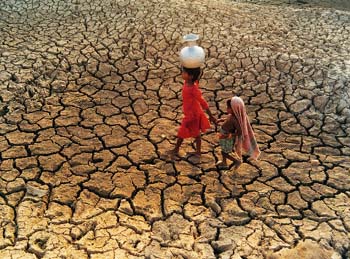Toward a New Paradigm of Duty: Food Security in Protracted Crises at the CFS

In July 2014, the Agenda for Action addressing Food Insecurity in Protracted Crises (A4A) within the Committee on World Food Security (CFS) were set to enter the final negotiations, on track to be endorsed during the 41st Session of the CFS in October 2014. However, as negotiations began, it was clear that the process would be longer than planned and the document would not be ready for endorsement by the proposed deadline.
During the negotiation session, the Civil Society Mechanism (CSM) working group was well prepared to defend and develop important elements within the A4A, especially the human rights-based framework and corresponding obligations, “occupation” as an underlying cause of protracted crises, a reference to the extraterritorial nature of human rights obligations and food security issues related to displaced persons in situations of protracted crises. For such a document to be negotiated by states, these issues remained either unclear, misunderstood or contentious, despite two years of Rome-based deliberations and expert meetings. As in many international processes, these operational termsand concepts proved to be sticking points within other policy negotiations in the CFS.
Despite three days of intense negotiations, including night sessions, the Committee was unable to finalize the process. The negotiations ended with many core provisions “in brackets”(still to be negotiated), and a “plan of action” developed in a parallel session withoutany specificity or accountability.
It is unfortunate that this document was not finalized in a more-efficient way; however, with the CFS agenda overloaded with many topics, including the high-stakes Principles for Responsible Investment in Agriculture and Food Systems (RAI), the A4A was not given its due attention within the CFS until now. While these specialized topics required specialized information on the part of state delegations, the state delegations without the necessary background, as well as those states with an obstructive agenda, slowed the process, necessitating the postponement.
HIC-HLRN coordinator Joseph Schechla, Arab Group for the Protection of Nature’s Razan Zuayter and Mariam Jaajaa (Jordan), as well as `Abla Mahdi of the Society of Eve (Sudan) participated in the CSM delegation from the MENA region. Mr. Schechla noted that, “among the lessons learnt from this experience is that this subject of protracted crises also poses a training opportunity for state delegations.” He added that “meetings with delegations at the negotiations revealed also that some heads of delegations misinformed their capitals about the legal issues involved and the human values at stake, apparently because they did not possess the needed vocabulary or training.”
Despite this chronological setback, the CFS now faces anopportunity to push for an improved A4A with a strong action plan, as the CFS secretariat, many states, UN agencies and other stakeholders have prioritized this issue for the coming year. The annual CSM forum (2014) set the A4A as the top priority for 2015, and the CSM is committed to moving forward in the negotiation process toward an outcome that pursues real change for the most vulnerable, food- and nutrition-insecure communities.
In that vein, the HIC-HLRN delegate expressed hope: “We look forward to this process evolving into a rare effort of international cooperation toward shared problem-solving within a normative frame—that is, consistent with international law obligations of states—and operational in actual practice.”
In order to achieve this goal, the CSM working group encourages placing communities in protracted crises at the center of the discussion and negotiation process, as well as the efforts toward resolving protracted crises with the right kind of international cooperation. CSM has long advocated that this paradigm shifttake ahuman rights approach, particularly operationalizing the human right to food at the core of the document and prescribed action, consistent with the CFS Global Strategic Framework.
Human Rights Instruments, including the Guidelines for the Realization of the Right to Adequate Food in the Context of National Food Security, reiterate guaranteed rights and protections, and guide community and global responses to restore rights and livelihoods afflicted by conflict and disaster. The CSM has made it clear that it will not accept a document that does not recognize these guidelines.
It is equally imperative that the A4A has clear, concise and accountable actions, with roles for all relevant stakeholders. This includes UN bodies such as the UN Secretary General (SG),the High-level Task Force on the Global Food Security Crisis, the SG’s Special Representative for Food Security and Nutrition,and the special procedures of the UN Human Rights Council.Such coordination is consistent with the CFS 39th session (2012) decision to initiate the A4A process. CFS then called for the A4A to contain “immediate, purposeful and coherentaction by all stakeholders to promote food security and nutrition in the context of protracted crises.”
It is crucial that civil society demand an actionable and accountable document, in order to meet the goal of ending hunger and food insecurity, and to support policy that works toward the realization and operationalization of the right to food.
The revised timeline for the A4A is as follows:
November 2015: Revised draft available
- 30 January 2015: Open-ended Working Group Meeting
- 11–15 May 2015: Final Negotiations
- October 2015: CFS 42, Final Endorsement
For updates on the A4A process, including updated documents, visit the websites for the CFS and the CSM. You can also contact hic-mena@hic-mena.org for any questions or information. For more information on HIC involvement in the CFS visit here.
Front page photo: A Gaza farmer holds crops destroyed by Israeli troops. Source: Eva Bartlett/Electronic Intifada. Photo on this page: The effects of drought in India.
Source: AsiaNews.
|